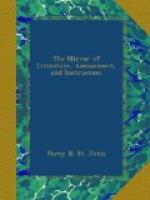The late Professor Pictet, of Geneva, who had spent some of his early days in England, and was very fond of it, told me some curious anecdotes of his countryman De Lolme, whose book on the English constitution is much more commended than it deserves. He once endeavoured to set up a rival Journal to Old Swinton’s Courrier de l’Europe, but his absurd denial of Rodney’s victory ruined the project. De Vergennes, the French minister, patronized it. Brissot was connected with Swinton in the above-named Journal. One of Swinton’s sons holds a high situation in the British Government in India:—another commanded a ship in the Company’s service. Old Swinton was a Scotch jacobite, and forfeited.
Horace Walpole, who died Earl of Orford, was a little old man with small features—very lively and amusing,—who talked just as he wrote: but a little too fond of baubles and curiosities. He had a witty mind, but not a great one:—yet he was a man of genius. His family was ancient, but his vanity made him always endeavour to represent it of much more consequence than it was. They had a great deal of the Norfolk squierarchy about them. He could not bear his uncle Horace, the diplomatist, whose son, the grandfather of the present earl, with his little tie-wig, looked like an old-fashioned glover.
I have mentioned Mrs. Macauley, the historian. She had a dog latterly, of which she made a great pet, and on being asked why she bestowed so much care on it, she answered—“Why! are you aware whence it came? It is a true republican, and has been stroked by the hand of Washington!” The event of the French Revolution maddened her with joy; but when the news came of Louis the Sixteenth’s escape, and before she heard he had been brought back, she took to her bed, wrote to her friends that she should die of the disappointment—and did die. She complained that Dr. Graham had given her a love-potion! Her young husband used her ill.
Tom Warton, the poet, was a good-natured man, but addicted to low company. He was fond of
“Smoking his pipe upon an alehouse bench;”
He was tutor to Colonel North, the son of the minister, who thought he neglected him. This connexion, perhaps, led him to write the Life of Sir Thomas Pope, or rather that this family were founders of Warton’s college. He also wrote the life of the President Bathurst, who was elder brother of Sir Benjamin Bathurst, a commercial man, father to the first Lord Bathurst, the friend of Pope the poet, and who lived to the age of ninety, in possession of his faculties,—always calling his son, the Chancellor, “the old man!” He was one of Queen Anne’s twelve peers—but so rapid has been the extinction and change, that the Bathursts are now considered old nobility. He sprung from one of the Grey Coat families in the weald of Kent, the clothiers.




